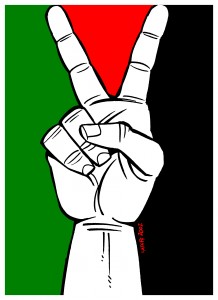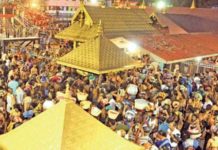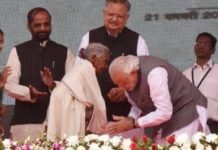Raji Gururaj
Class of 2017 – NUALS (Kochi)
A critical engagement with the genesis of the Israeli-Palestinian conflict introduces much needed perspective and clears the field of misconceptions furthered by the media, or otherwise. The indigenous population of Palestine was primarily Muslim, with a Christian and smaller Jewish minority. Following World War I, Britain arranged for the League of Nations to make Palestine a British ‘mandate’ i.e. a colony to be administered by Britain and prepared for independence.
Jewish immigration to Palestine was relatively limited until the 1930s, when Hitler came to power. The U.S. and Europe closed their doors to immigration by desperate Jews, making West Asia one of the few options. By World War II, the Jewish community had greatly increased in numbers, and was better armed and better organised than the Palestinians. In November 1947, the UN General Assembly voted to partition Palestine into two independent states, a Jewish state and an Arab state, joined by an economic union, with Jerusalem as an international area under UN administration. The Palestinians rejected partition but the Zionists (advocates of Jewish nationalism; a precise definition is intentionally not being provided, for the term has become deeply politicized in contemporary debates) accepted it.
Arab armies crossed the border on May 15, 1948, after Israel declared its independence. When agreements were signed in 1949, the Palestinian state had disappeared, its territory taken over by Israel and Jordan, with Egypt in control of the Gaza Strip. Jerusalem, which was to have been internationalized, was divided between the two states. Israel was now in effective control of 78% of Palestine. Some 700,000 Palestinians had become refugees. The Arab areas along the borders of Israel were declared military security zones, which meant that Palestinians were living under martial law conditions for nearly 20 years. The Palestine Liberation Organisation (PLO) was formed in 1964. In 1967, Israel waged war and occupied almost the whole of Palestine. During this time, Palestine was accorded the status of ‘non-member observer entity’. The status was upgraded to ‘non-member observer state’, on November 29th, 2012. Critics of the UN alleged that these were empty terms but did not reflect any respect for either the Palestinian people or their legitimate political representatives.
What does Palestine want?
The Palestinians seek to establish an independent sovereign state in the West Bank, including Jerusalem and the Gaza strip which was occupied by Israel in the war of 1967; in other words they want to go back home embodied in the succinct demand for the ‘right to return’. Two decades of intermittent peace talks have failed to crystallize a tangible, political solution, with each side blaming the other for failure. The most recent negotiations in 2010 failed, with the script being uncannily similar to the ones before. In September 2011, Muhammad Abbas, the West Bank leader of Fatah, sought full member-state status at the UN, but this was denied as the members of the Security Council were unable to ‘make a unanimous recommendation’. Mr. Abbas then requested that a non-member observer state status be given to the stateless Palestinians.
Current Developments
On the 29th of November this year, the UN implicitly recognised Palestine as a sovereign state, despite threats by the U.S. and Israel. Palestinian President, Mahmoud Abbas led the campaign to win support for the resolution. It allows Palestinians access to the International Criminal Court and some other international bodies, should they choose to join them. The move required only a simple majority of the 193-member General Assembly. The vote was held on a symbolic date, the 65th anniversary of the UN partitioning British-ruled Palestine into Jewish and Arab countries.
The vote raises Palestine from “a non-member observer entity” at the UN to “a non-member observer state”. There are only two with this status, the Vatican and now Palestine, both classified as sovereign states but are not allowed to vote at the general assembly with the other 193 countries.
The voting
In the assembly consisting of 193 members, 138 voted for the resolution, only 9 voted against, and 41 abstained. Apart from Israel and the US, those voting against were Canada, the Czech Republic, the Marshall Islands, Micronesia, Nauru, Palau and Panama. European countries such as France, Italy, Spain, Norway, Denmark and Switzerland all voted yes. Britain and Germany both abstained, with Britain saying that Abbas had failed to promise he would resume peace negotiations with Israel.
The resolution had to be passed by a simple majority, and there was no threat of veto, as in the Security Council.
Implications
Although the new status is less of an achievement than full membership, the move is highly significant. The Palestinians can now participate in General Assembly debates. It can seek membership of several U.N. agencies and apply to sign the statute of the International Criminal Court. This way, at least in theory, Israel can be held accountable for crimes against the civilian population in Gaza. It represents a new international resolve to ensure that Palestine is able to exercise its right to statehood. The right to self determination morphed from being mere hollow words and changed the disturbingly asymmetric landscape of the politics of the region.
Palestinians believe that admission as a non-member observer state will strengthen peace talks with Israel on issues such as, inter alia, the status of Jerusalem, Jewish settlements, border negotiations and the right to return. Israel, with baffling predictability, stated that this move would weaken peace talks. Netanyahu then, in a move that smacked of the times of Golda Meir, shocked even his most ardent supporters when he announced that new Jewish settlements would be built that would effectively dissect West Bank and link Israel to the Jordan River, a curious ambition for most Zionists (see http://www.economist.com/news/leaders/21567939-even-miserable-standards-peace-process-israels-proposed-new-settlements-are). The world stood by and muttered platitudes as international law died a little.
The vote leaves Palestine far short of full UN membership. The reality of Israeli control on the ground also ensures Palestine is far from being an independent state. This does not undermine the importance of the vote, however symbolic. It allows Palestine for the first time to join international bodies such as the International Criminal Court. It gives the disenfranchised people a voice at the world’s most important multilateral forum.
Vitriolic opposition by Israel was blamed on the threat of invoking the Rome Statute that the Palestinians would possess, an earlier attempt was shot down by Louis Moreno-Ocampo who cited this very issue-that Palestine was not a legitimate state in international law and therefore ran afoul of Article 12 of the Rome Statute. The issue is still being debates, both in the blogosphere and by the ICC (see http://opiniojuris.org/2012/12/13/appeals-chamber-confirms-retroactive-ad-hoc-jurisdiction/)
Finally, there are domestic political implications as well. Gaza dominated by Hamas had been under international scrutiny after Israel’s senseless offensive but the vote won by a Fatah leader shifted the scales. This domestic divide, often chanced upon by Israel, was bridged for a brief moment when Hamas and Fatah fighters were seen rejoicing together in the streets of Gaza and the West Bank, analysts feared that might be short-lived. Both parties vie for both international and domestic recognition, each governing two separated parts of the homeland, where Palestinians today are “victims of the victims, the refugees of the refugees”.
Suggested reading :
- http://www.bbc.co.uk/news/world-middle-east-13701636
- http://www.un.org/apps/news/story.asp?NewsID=43640&Cr=palestin&Cr1=#.UMi1PIPqmSp
- http://www.palestine-studies.org/enakba/history/Khalidi,%20Walid_The%20Palestine%20Problem.pdf
- http://www.thehindu.com/opinion/editorial/a-step-closer-to-palestine/article4151225.ece
- For those who’re interested and have time to spare, Kafila has some brilliant articles on the issue. See http://kafila.org/2012/11/12/israeli-apartheid-and-palestinian-resistance-iii-imagining-post-zionist-futures/ and http://kafila.org/2012/11/28/sex-lies-and-gods-promise-response-to-a-diatribe/ to get started.
















Where the hell wld hav been if CG was NT there . thnxx gys for he post and eagerly awaiting for the further compendiums
Good research and well written.
thanks for a well comprehensible,brief and useful post 🙂
A very well compiled article, Please do keep up the good work..:)